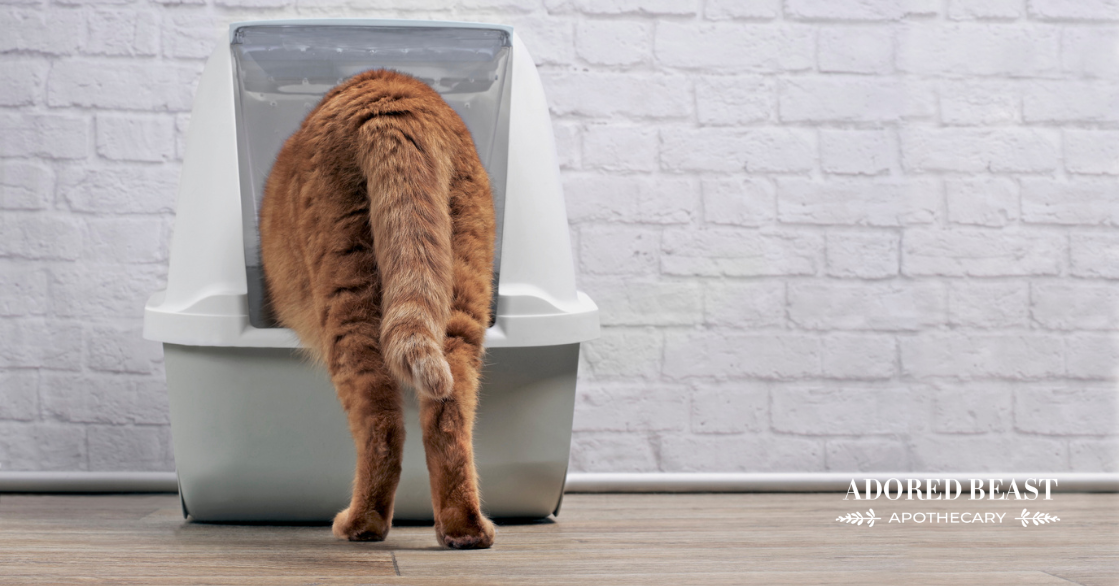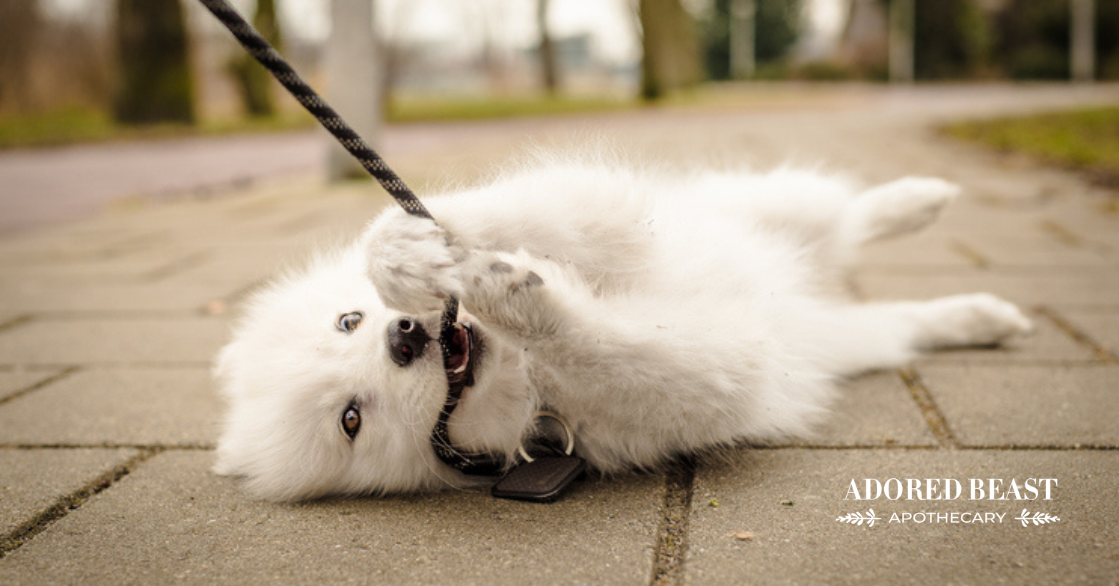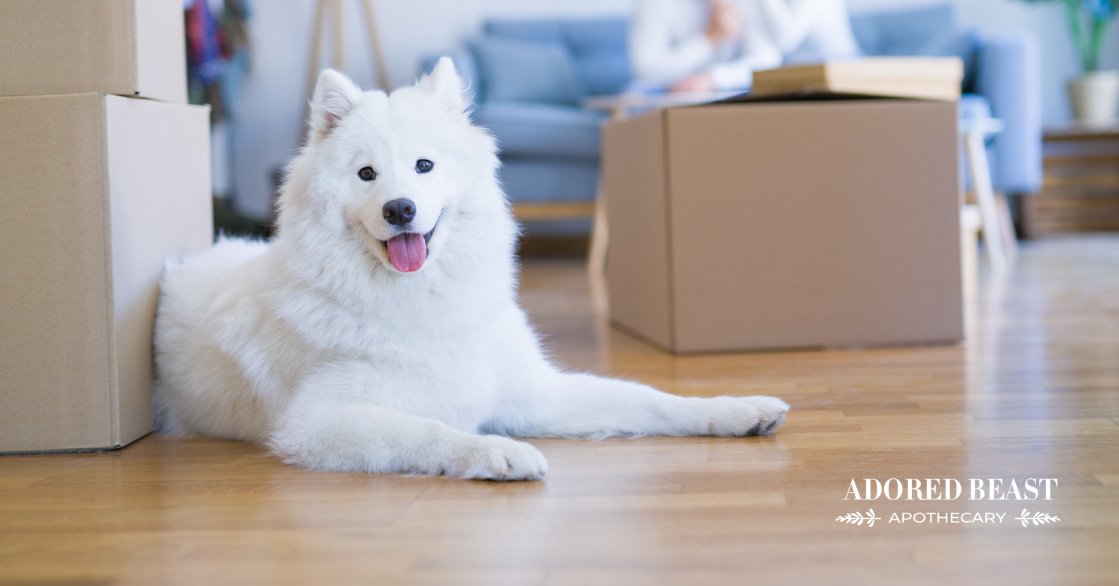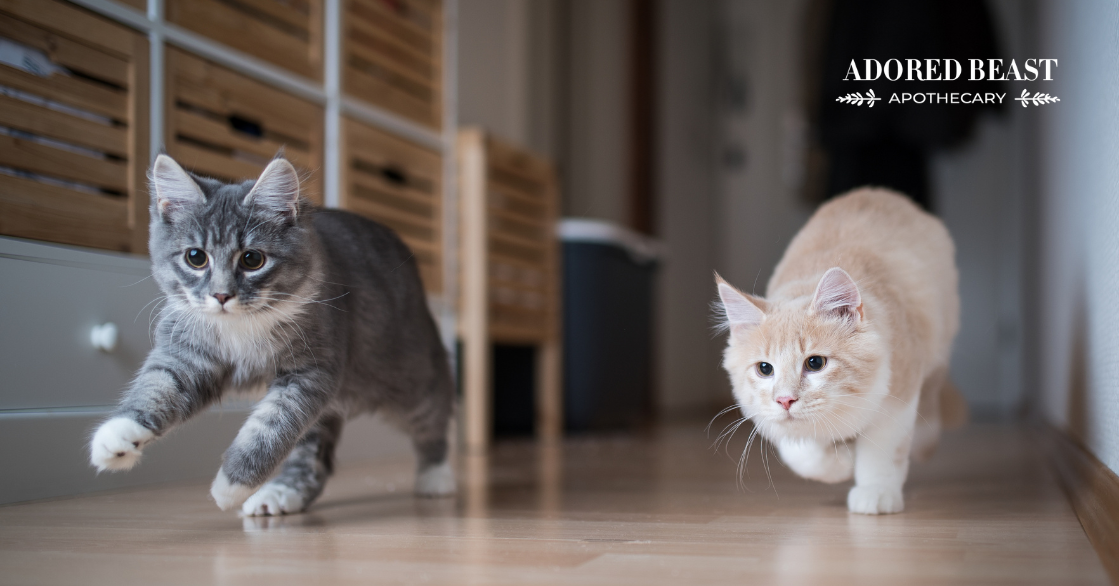It happens…
You’re walking past the area of your home where the litterbox is, and your nose gets a whiff. You know that pungent aroma that is different from the “regular” smell… uh oh, cat diarrhea!
If your kitty has runny poop, don’t panic. There is almost always an explanation, and there are a variety of approaches you can take get things back on ‘solid’ footing, if you will.
Identifying the culprit is important from the very beginning.
But even before that…
Which Cat?
This is important.
If you share your home with more than one cat, it’s vital to learn their bathroom habits. After all, if you have multiple cats, and you find diarrhea in the litterbox but didn’t see it happen, how can you tell which cat is having the tummy troubles?
There’s such a wealth of information for us in the litterbox that we can use as a tool to help improve the health and lives of our feline friends.
Familiarize yourself with your kitty’s bathroom routine right from the get-go:
- where
- when
- how much
- how often
- smell
- colour
- consistency
This will help you establish a healthy baseline, and make it easier to identify when there is a problem or issue, and thus, which cat is having the trouble.
Common Causes of Cat Diarrhea
Just as with dogs (or humans for that matter), when it comes to cat diarrhea, there may be a variety of reasons for runny poops.
But first, let us start by saying don’t ignore it. Diarrhea can lead to dehydration quickly in our kitties, and that can become serious. You have to make sure that you cat stays well hydrated!
The seriousness of diarrhea depends on how long the diarrhea has persisted, and how many other clinical signs your cat has. If diarrhea happens once or twice, it might just be a basic intolerance to something they ate. However, if it continues for more than 2-3 days, and/or gets worse, speak to your trusted veterinarian. If you do make an appointment, don’t forget to gather a fresh stool sample, if possible, to take with you. Cat diarrhea may be a sign of something more serious, as we mentioned above, and it’s worth checking out, just to be on the safe side. Always trust your gut.
1. Diet
We always look to diet first when things start to soften up in the stool department. You will often see it if your cat eats something she isn’t used to eating, or if you quickly change foods. It doesn’t mean they’ve eaten something bad, it just means it could be something their body isn’t quite accustomed to. For example, if a cat is used to eating only kibble, switching to raw may temporarily result in some runny poop. (TIP: Take it very slow when transitioning a cat to a new food.)
That said, when a cat eats something they shouldn’t be eating, this too may result in diarrhea. It could be spoiled food, food that’s unsafe for kitties, or just something that they have a sensitivity to. Foreign bodies can also lead to diarrhea (or vomiting).
2. Stress
Does your body ever act out when you’re stressed? Your gastrointestinal tract in particular? It can be the same for our feline friends. Both long-term and short-term stress can impact stool consistency.
Is there something new happening in your cat’s life or environment? A new home or family member, a lost friend or companion, a change in your work schedule? Are you stressed? If you can identify something that may be causing your cat stress, try to work on reducing it if possible. And yes, your kitty can feel your own stress – and it can have a cascade effect. Working on stress reduction for yourself can be beneficial for you and your cats too <3
3. Medications
Some medications can cause irritation in the gastrointestinal tract, leading to diarrhea. This can include antibiotics or NSAIDs. Flea and tick meds, dewormers, really anything from the pharmacological family, can have an effect on the gut. If your cat is on any medications, check with your veterinarian about the possible side effects.
4. A Viral, Bacterial, or Parasitic Infection
In many cases, the first sign you’ll see of an infection is diarrhea. Bacteria, viruses, coccidia, and intestinal worms are some of the most common culprits.
Watch for other signs (lethargy, vomiting, lack of appetite, fever and, in distemper, coughing) and head to the vet if you think this might be the cause. Bacterial infections can come from a variety of places, including food poisoning from spoiled food or drinking contaminated water outside.
5. Pre-existing or Underlying Medical Condition
Sometimes cat diarrhea can be a symptom of a pre-existing or underlying condition. It can be common in cats with conditions such as pancreatitis, colitis, IBS, or an endocrine issue. If you know that your cat has one of these conditions, and she has started having diarrhea, speak with your trusted veterinarian.
6. Toxins in Their Environment
Certain toxins our cats are exposed to may cause diarrhea. Usually, for a kitty, that means things like toxic plants (lilies for example) or toxic chemical exposure (cleaning products/pesticides). Of course, exposure to these things depends on their lifestyle (are they exclusively an indoor cat, or do they venture out into the great wide world?), but knowing what they may have come in contact with can be incredibly helpful when trying to determine the cause of cat diarrhea.
Find out more about pet-safe plants at this post, and about pet-safe cleaning at this post.
How to Help Firm Up Those Stools
Thankfully, there are many difference things you can do at home to help your kitty.
For at home-remedies, there are several things we’ll reach for.
1. Probiotics
If something is off in the gut, you want to work on rebalancing the microbiome. That means helping to repopulate the good bacteria so that it can fight the harmful bacteria. Probiotics do just that – they encourage those friendly bacterial populations.
For probiotics, don’t forget the prebiotics – they feed the probiotics and help them thrive. We have several different pre and probiotic blends that are great for cats. Try our feline-specific pre and probiotics, Felix’s Flora, or our Gut Soothe, with its combination of pre and probiotics and anti-inflammatory herbs (including those we list below!).
2. A Bland Diet
Again, if something if off in the gut, you don’t want to irritate it by feeding rich, harder to digest foods. You want simple, bland, but highly nutritious options that will support your feline friend while helping to keep things calm. One of our favourites to add-ins to this bland diet is bone broth. It’s very easy on the digestive system, but at the same time provides valuable nutrition and hydration! Here’s how we make it – just don’t add anything but bones, raw apple cider vinegar, and filtered water – no added veggies or herbs!
3. Slippery Elm
Herbalists have long celebrated the virtues of slippery elm as a digestive helper. This is largely thanks to its ability to act as a demulcent. Demulcent plants contain a polysaccharide molecular complex called mucilage. When this mucilage comes in contact with water, it turns into a slimy, gel-like substance. This substance coats the GI tract, and can soothe irritation. And research backs this! A 2013 study on vomiting and diarrhea in dogs and cats tested the efficacy of slippery elm in a veterinary setting. The results were pretty incredible: 77% of cats with vomiting and 79% with diarrhea responded positively to slippery elm within 2 days.
Slippery elm is easy to use. You can add it mixed into your cat’s regular food, or blend it into a little bit of water or gentle bone broth. If you buy slippery elm as a single supplement, be careful of the ratio. If it’s just a basic 1:1 powder, dosage guidelines go by weight, and recommendations are 100mgs per 10lbs of body weight, two to four times daily. Sometimes, that ratio may be much higher, so just be aware of the strength of your herb. Before you give it to your cat, make sure you do your research and calculate safe ratios and/or speak to a trusted animal herbalist.
4. Marshmallow Root
Like slippery elm, marshmallow root is well-known for helping to calm and soothe digestive upset. That’s because it too is a demulcent plant, producing that gel-like substance that coats the digestive tract.
This herb is easy to give. Mix it in with your cat’s regular food or with a little bit of bone broth – most pets don’t mind it. This herb is also fairly easy to find, but just as with slippery elm, you want to think about the type you use, the strength, and amount guidelines. We like low-or no alcohol tincture extracts or a tea infusion (two tablespoons of dried herb in 8 ounces of almost boiling water and steep covered for 20-30 minutes. Let cool but keep covered), about 1/4 tsp per 20lbs of body weight, 3 times a day or as needed.
5. Pure Pumpkin
Pumpkin is like a miracle squash when it comes to poop. And it’s almost magical, as the high fibre content works both ways (it can help address both diarrhea and constipation). Try 1/4 to 1/2 a tablespoon to start. Now, some kitties will happily lick pumpkin puree off a spoon – others will not. Don’t force them. If it’s not for them, it’s just not for them. Please remember: pure pumpkin puree only, not pumpkin pie filling.
**With dogs, fasting for a period of time is often recommended to give the GI tract time to settle down. With cats, however, we don’t recommend fasting. It just isn’t something we suggest doing with our kitties.
6. Homeopathics
Homeopathy can be a game changer in episodes of diarrhea
First things first – and this is important. Homeopathy is not like a drug. The amount isn’t based on weight, and it doesn’t matter if your animal has 2 pellets or 6. Yes, it’s hard to wrap your head around this one, but it’s just the way it works. As long as some of the remedy gets into your pet, the energy of the remedy will be able to get to work.
Give the first round of pellets of the remedy and watch for any signs of improvement. You can add a few pellets to a small cup of water, let it sit for 20 minutes, and give 1 teaspoon of the water to your animal. Give it every 20 minutes, three times. If, after that, you haven’t noticed a change, for the better (less frequency, less straining, sleeping and not restless) try a different remedy. But if there is constant improvement give the next dose in 2 hours then the next in 4 hours then the next in 8 hours.
Remedies are chosen based on which one fits your animal’s overall symptoms:
Our top remedies:
- Arsenicum album 30C – When the urge is fast and furious and often, sometimes they cannot make it outside. They are more often than not restless and cannot get comfortable for long. This remedy is helpful when you know it’s because of eating something rotten like spoiled food in the garbage. There can be lots of straining and even some drops of blood.
- Nux vomica 30C – This is if you think it’s more from over-eating or if there is the slightest thought that they could have eaten something slightly toxic. There is lots of cramping, gas, and straining and they can be a bit irritable and not want to be touched or coddled.
- Phosphorus 30C – These cats are typically sweet-natured and love everyone and attention. This remedy is good for fats, meaning if they have gotten into something fatty or you have done a diet change too quickly. It’s also great for IBD when there is often streaks of blood and or drops of blood. They can be thirstier than normal with the diarrhea as well. It’s a good stress-induced diarrhea remedy from noise or fear or driving in the car.
Adding aconite and arnica 200C to all the above remedies is so helpful for pain and discomfort. Just add it to the water of whatever remedy you choose.
By being observant and armed with the knowledge and tools necessary to help your feline friend with recovery, simple diarrhea can easily be remedied at home a lot of the time and most cats will make a full recovery in just a few days. When it isn’t so simple, take your kitty (and that stool sample, if possible) to your trusted veterinarian for evaluation. No matter the situation, don’t panic – with a little information and a lot of TLC, your feline friend will have all the support she needs to get bak to her best self.












![[RESEARCH] Is Herbicide Safe for Dogs?](https://blog.adoredbeast.com/wp-content/uploads/2025/06/herbicides-safe-for-dogs-103x55.png)